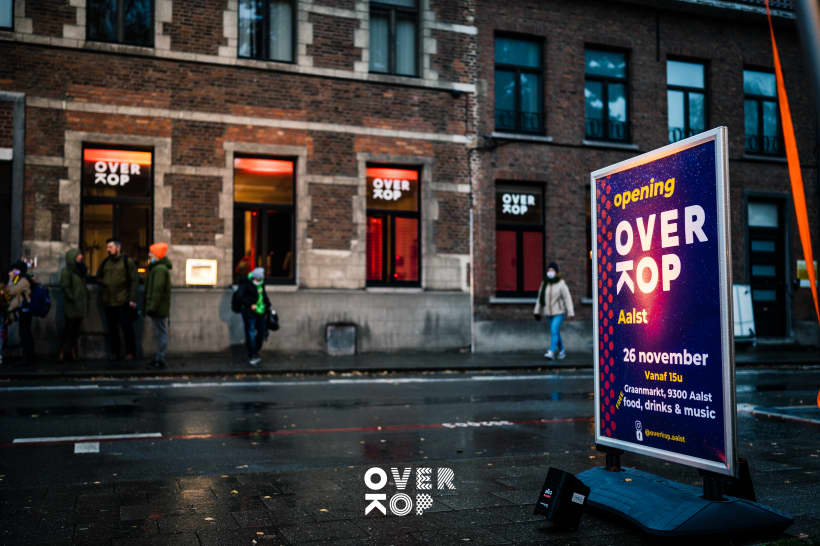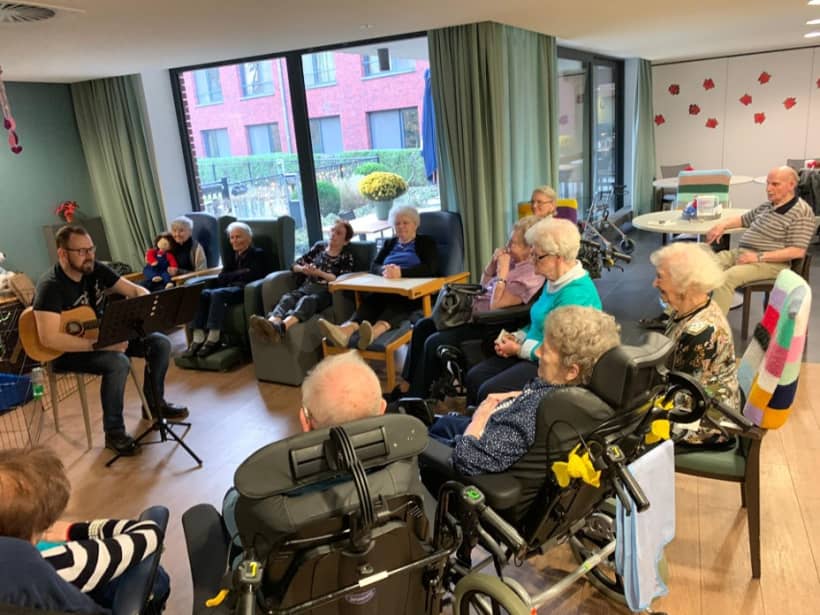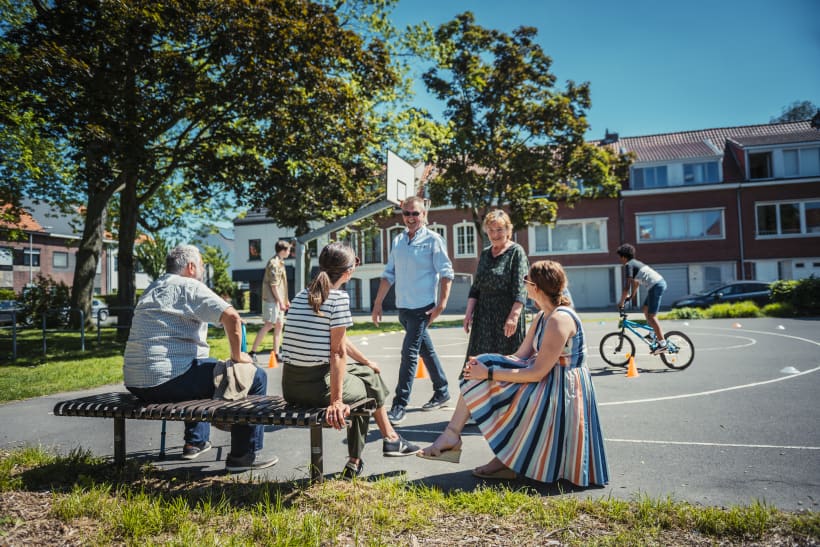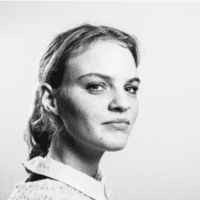Empowerment and resilience for all
The Government of Flanders strives for a warm and inclusive society and empowers people via Flemish Resilience. In this way, it wants to ensure that we feel better about ourselves and that young people and vulnerable groups are empowered and made more resilient.
Strengthening mental well-being
To boost mental well-being, the recovery plan invests additional resources in the helplines 1712, Tele-Onthaal, chat Nupraatikerover.be, the Druglijn (Drug Hotline), and the Zelfmoordlijn (Suicide Hotline) 1813.
More information is available on zorgenvoormorgen.be (in Dutch)(opens in new window)
Check out the dashboard (in Dutch), via which the Flemish public administration is monitoring the recovery and the key indicators (in Dutch) that the recovery plan aims to have a direct/indirect impact on, with a focus on healthy growth.
OverKop has pretty much saved my life.
OverKophuizen

The Government of Flanders offers young people low-threshold and safe drop-in meeting places in the form of 33 OverKophuizen. Here, they can find a listening ear and get professional help, without being stigmatised.
‘OverKop has pretty much saved my life,’ says Alicia (21). ‘When you feel you have no one to turn to, OverKop can really mean something in your life. Not only can you go there when you need help, but you can also just be there, without having to talk about stuff. Simply taking part in activities or making new friends can help enormously when you’re not feeling okay. I have made new friends here really quickly. OverKop is so versatile that it really opened up a whole new world for me.’
More information on the OverKophuizen (in Dutch)(opens in new window).
Huizen van het Kind
The Government of Flanders is investing recovery funds in 24 Huizen van het Kind (Children’s Centres) that offer integrated services to families with children and to prospective parents. They can go there for preventive healthcare, games, encounters, and family support. In addition, some families often need support in other areas, such as childcare, education, work, training, (civic) integration, and poverty reduction. Because these needs are often intertwined, service integration really makes a difference.
Working area ‘Family coach’ Leuven
The working area ‘family coach’ is one of the Children’s Centres where the City of Leuven and the Public Social Welfare Centre (OCMW), together with network partners, support vulnerable households with children up to 13 years of age. In the fight against (child) poverty, the family coach offers them low-threshold, long-term, and integral support pathways and combats under-protection.
More information is available at huizenvanhetkind.be(opens in new window).
Crisis counselling

To respond to the increasing number of worrying family situations, the Government of Flanders is investing Flemish Resilience funds to deal with crises in households. In this context, 332 additional crisis counselling pathways could be launched. Crisis counselling for family conflicts lasts an average of 28 days and can be provided on an outpatient basis, in combination with a stay, or start from the children’s and young people’s networks.
Crisis counselling in practice
Stijn Beirens explains how crisis counselling works. ‘A mother asks for help because there are conflicts within the household with her adolescent son. The crisis counsellor conducts talks with the mother, father, children, grandparents, and child psychiatrist over a period of four weeks. These talks take place at home, during a walk, online, or by telephone. Afterwards, the father is more involved and the members of the household have a better understanding of how and when tension builds up. They receive low-threshold follow-up help and can make appointments with the Pupil Guidance Centre (CLB) and the psychiatrist. At the end of the counselling, the young person can continue to live at home.’
In the case of crisis counselling, the vast majority (77%) were able to return home afterwards. A stay in a facility or hospital was sought for 20% of the young people and 3% found a solution in their own network.
The Ideal World pilot projects
The Government of Flanders wants to better support children and young people in residential youth support with recovery funds for the pilot projects The Ideal World (‘De ideale wereld’). Within these projects, all actors in youth support have a shared responsibility and share expertise. It allows them to prevent pathways from becoming blocked.
Breaking patterns
Youth support wants to create as many opportunities as possible for children and young people who need extra support. Some minors have a hard time in residential youth support. In this case, they are referred to another type of support based on the idea that a new place offers new opportunities. Sometimes, organisations drop out and patterns repeat themselves, with no further support being given. And then the search for even more specialised support starts all over again.
Because of these interruptions in the support pathways, children and young people do not always receive the best support. Sometimes, the young people and their families lose sight of the overall picture. The project ‘Shared responsibility and the ideal world’ wants to reverse this dynamic of interrupted support by taking a different approach to the support and by setting up collaborations between all the actors.
More information is available at Ideal worlds | Youth support (in Dutch)(opens in new window).
Residential care for the elderly

Empowering society also means caring for the elderly. That is why the Government of Flanders is investing recovery funds in additional staff for residential care centres. Over 2,600 people will strengthen the multidisciplinary teams in various residential care centres.
Residential care for the elderly offers a lot of employment opportunities. Healthcare assistants and nurses are being recruited for the daily care of the residents, in addition to physiotherapists, speech therapists, dieticians, occupational therapists, and psychologists. Logistical staff are also needed to carry out domestic tasks, so that the care workers can focus on providing tailor-made care for each resident.
Music in your life
Zorgbedrijf Ouderenzorg Genk, for example, recruited a music therapist. Maarten Biesmans considers it his mission to use music as a central guiding principle to improve the quality of life of residents, family members, and staff alike. ‘Music brings you to a place where both the present and your deepest memories come together - a place that you can share and that invites you to connect with others.’
Extra pair of hands, eyes, and heart
Lucia, a graduate in remedial education, started working as a part-time reactivation worker at a residence for people with dementia. Lucia provides extra care at meal times, and encourages residents to walk or cycle on the recumbent bicycle. ‘There are many ways to motivate people to do something,’ Lucia says. ‘It is often the small moments that are really important. Just listening sincerely and having a spontaneous chat puts a smile on their faces. So much can be achieved by using humour, dance, and music in all kinds of ways. To me, being sincerely present and making contact with the residents is the most important thing. I have a lot of tasks to do in the morning, but that is precisely the challenge. I see myself as an extra pair of hands, eyes, and heart. I am present among the residents when the care workers are still busy with other tasks. I just wait and see where the needs of the team lie, and can contribute to making life in the residence beautiful in this way.’
Caring Neighbourhoods

The Government of Flanders finances 133 Caring Neighbourhood projects with Flemish Resilience funds. A caring neighbourhood (‘Zorgzame Buurt’) is one where young and old live together, where people feel secure, where quality of life takes centre stage. A caring neighbourhood helps to prevent loneliness: it is all about ‘doing small things’, meeting people, and showing solidarity.
Birgit Goris, lecturer at UCLL and neighbourhood coach since March 2022, is supervising ten projects spread throughout Flanders. ‘I think Caring Neighbourhoods is a very cool project because a lot of things come together. Partners from the welfare and care sectors work together and citizens help set the pace,’ she explains. ‘It is actually one of the first projects where a government starts from the bottom up, giving the biggest voice to the people who live in the neighbourhood. Social professionals cannot help but follow that pace and adapt to it. This is unique.’
‘A caring neighbourhood must take the time to create a strong and diverse network,’ explains Goris. ‘Make sure you decide yourself to go outside and to be present in places where you can meet people. Don’t expect people to come to you because there are always barriers, even if you explicitly say you are very easy to approach.’
The aim is to put the project on the international map as a good practice.
More information is available at A new perspective on the neighbourhood | Caring for Tomorrow (in Dutch)(opens in new window).
